De Engelse dichter en schrijver Robert Browning werd geboren op 7 mei 1812 in Londen. Zie ook alle tags voor Robert Browning op dit blog.
Two in the Campagna
I
I wonder do you feel to-day
As I have felt since, hand in hand,
We sat down on the grass, to stray
In spirit better through the land,
This morn of Rome and May?
II
For me, I touched a thought, I know,
Has tantalized me many times,
(Like turns of thread the spiders throw
Mocking across our path) for rhymes
To catch at and let go.
III
Help me to hold it! First it left
The yellowing fennel, run to seed
There, branching from the brickwork’s cleft,
Some old tomb’s ruin: yonder weed
Took up the floating weft,
IV
Where one small orange cup amassed
Five beetles,—blind and green they grope
Among the honey-meal: and last,
Everywhere on the grassy slope
I traced it. Hold it fast!
V
The champaign with its endless fleece
Of feathery grasses everywhere!
Silence and passion, joy and peace,
An everlasting wash of air—
Rome’s ghost since her decease.
VI
Such life here, through such lengths of hours,
Such miracles performed in play,
Such primal naked forms of flowers,
Such letting nature have her way
While heaven looks from its towers!
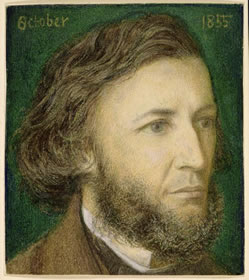
Robert Browning (7 mei 1812 – 12 december 1889)
Portret door Dante Gabriel Rossetti, 1855
De Amerikaanse dichter en politicus Archibald MacLeish werd geboren op 7 mei 1892 in Glencoe, Illinois. Zie ook alle tags voor Archibald MacLeish op dit blog.
The Too-Late Born
We too, we too, descending once again
The hills of our own land, we too have heard
Far off — Ah, que ce cor a longue haleine —
The horn of Roland in the passages of Spain,
The first, the second blast, the failing third,
And with the third turned back and climbed once more
The steep road southward, and heard faint the sound
Of swords, of horses, the disastrous war,
And crossed the dark defile at last, and found
At Roncevaux upon the darkening plain
The dead against the dead and on the silent ground
The silent slain—
The End Of The World
Quite unexpectedly, as Vasserot
The armless ambidextrian was lighting
A match between his great and second toe,
And Ralph the lion was engaged in biting
The neck of Madame Sossman while the drum
Pointed, and Teeny was about to cough
In waltz-time swinging Jocko by the thumb—
Quite unexpectedly the top blew off:
And there, there overhead, there, there hung over
Those thousands of white faces, those dazed eyes,
There in the starless dark the poise, the hover,
There with vast wings across the cancelled skies,
There in the sudden blackness the black pall
Of nothing, nothing, nothing — nothing at all.
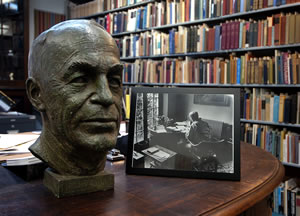
Archibald MacLeish (7 mei 1892 – 20 april 1982)
Buste in het Memorial Library Building in Deerfield, Massachusetts
De Australische schrijver Peter Carey werd geboren in Bacchus Marsh, Victoria, op 7 februari 1943. Zie ook Zie ook alle tags voor Peter Carey op dit blog.
Uit: Parrot and Olivier in America
„I had no doubt that something cruel and catastrophic had happened before I was even born, yet the comte and comtesse, my parents, would not tell me what it was. As a result my organ of curiosity was made irritable and I grew into the most restless and unhealthy creature imaginable — slight, pale, always climbing, prying into every drain and attic of the Château de Barfleur.
But consider this: Given the ferocity of my investigations, is it not half queer I did not come across my uncle’s célérifère?
Perhaps the célérifère was common knowledge in your own family. In mine it was, like everything, a mystery. This clumsy wooden bicycle, constructed by my uncle Astolphe de Barfleur, was only brought to light when a pair of itinerant slaters glimpsed it strapped to the rafters. Why it should be strapped, I do not know, nor can I imagine why my uncle — for I assume it was he — had used two leather dog collars to do the job. It is my nature to imagine a tragedy — that loyal pets have died for instance — but perhaps the dog collars were simply what my uncle had at hand. In any case, it was typical of the riddles trapped inside the Château de Berfleur. At least it was not me who found it and it makes my pulse race, even now, to imagine how my mother might have reacted if I had. Her upsets were never predictable. As for her maternal passions, these were not conventionally expressed, although I relished those occasions, by no means infrequent, when she feared that I would die. It is recorded that, in the year of 1809, she called the doctor on fifty-three occasions. Twenty years later she would still be taking the most outlandish steps to save my life.“
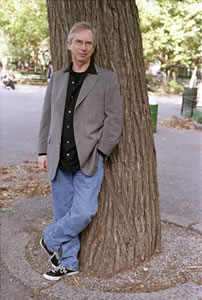
Peter Carey (Bacchus Marsh, 7 mei 1943)
De Bengaalse dichter en schrijver Rabindranath Tagore werd op 7 mei 1861 in Calcutta (tegenwoordig: Kolkata) geboren. Zie ook alle tags voor Rabindranath Tagore op dit blog.
Unending Love
I seem to have loved you in numberless forms, numberless times…
In life after life, in age after age, forever.
My spellbound heart has made and remade the necklace of songs,
That you take as a gift, wear round your neck in your many forms,
In life after life, in age after age, forever.
Whenever I hear old chronicles of love, it’s age-old pain,
It’s ancient tale of being apart or together.
As I stare on and on into the past, in the end you emerge,
Clad in the light of a pole-star piercing the darkness of time:
You become an image of what is remembered forever.
You and I have floated here on the stream that brings from the fount.
At the heart of time, love of one for another.
We have played along side millions of lovers, shared in the same
Shy sweetness of meeting, the same distressful tears of farewell-
Old love but in shapes that renew and renew forever.
Today it is heaped at your feet, it has found its end in you
The love of all man’s days both past and forever:
Universal joy, universal sorrow, universal life.
The memories of all loves merging with this one love of ours –
And the songs of every poet past and forever.
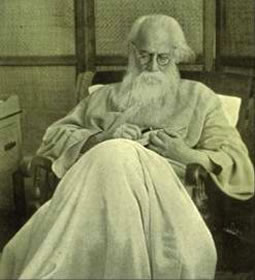
Rabindranath Tagore (7 mei 1861 – 7 augustus 1941)
De Franse schrijver en essayist Joseph Joubert werd geboren in Montignac op 7 mei 1754. Zie ook alle tags voor Joseph Joubert op dit blog.
Uit: Pensées
„Le plus beau des courages, celui d’être heureux.
*
Il est indigne des grandes âmes de faire part des tourments qu’elles éprouvent.
*
Quiconque s’agenouille devant Dieu se façonne à se prosterner devant un roi. »
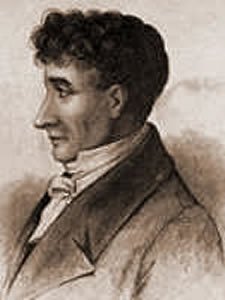
Joseph Joubert (7 mei 1754 – 4 mei 1824)
